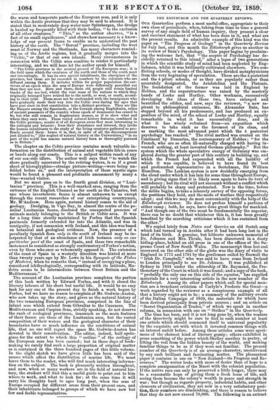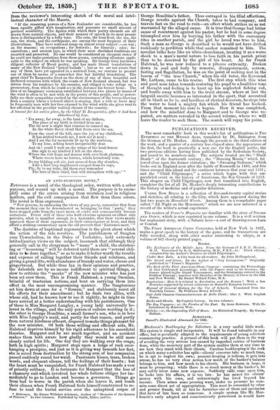THE EDINBURGH AND THE QUIRTR.a.T REVIEWS.
Ouit Quarterlies perform a most useful office, appropriate to their own class of periodicals, when, taking from time to time a general survey of any single field of human inquiry, they present a clear and succinct statement of what has been done in it, and what are the present results. An admirable example of this kind was the paper on " The Progress of Geology" in the Quarterly Review for July last, and this month the _Edinburgh gives us another in its review of Bain's Psychology. This paper begins by proclaim- ing the welcome fact, that " the sceptre of Psychology has de- cidedly returned to this island," after a lapse of two generations in which the scientific study of mind had been neglected by Eng- lishmen, whilst it was brilliantly cultivated elsewhere. Two con- flicting schools, or modes of thought, have divided metaphysicians from the very beginning of speculation. These are the a posteriori and the a priori schools, or as they are popularly rather than accurately designated, the Aristotelian and the Platonic. The foundation of the former was laid in England by Hobbes, and the superstructure was raised by the masterly hands of Locke and Hartley. Other workmen, successively developing the ideas of these two, have enlarged and beautified the edifice, and now, says the reviewer, " a new as- pirant to philosophical eminence, Mr. Alexander Bain, has stepped beyond all his predecessors, and has produced an ex- position of the mind, of the school of Locke and Hartley, equally remarkable in what it has successfully done, and in what it has wisely refrained from—an exposition which deserves to take rank as the foremost of its class, and as marking the most advanced point which the a posteriori psychology has reached." The rival method was created on the Continent by Descartes, the contemporary of Hobbes ; "for the French, who are so often ill-naturedly charged with having in- vented nothing, at least invented German philosophy." But the system which the whole speculative energy of Germany was em- ployed during the greater part of this century in building up, and which the French had expounded with all the lucidity of which it was capable, is believed to have found its best and profoundest representative in a Scotchman, Sir William Hamilton. The Lockian system is now decidedly emerging from the cloud under which it has lain for some time throughoutEurope, and is giving signs that it is likely soon again to have its turn of ascendancy ; but its rival will not succumb without a conflict which will probably be sharp and protracted. Now is the time, before the melee begins, to take a leisurely survey of the opposing forces, the positions they hold, and the mode of warfare they respectively adopt ; and this we may do most conveniently with the help of the Edinburgh reviewer. He does not profess himself a partisan of either camp ; both, he says, have done great things for mankind "And though one of the two must be fundamentally the superior, there can be no doubt that whichever this is, it has been greatly benefited by the searching criticisms which it has sustained from the other."
We copied lately from Notes and Queries an old Scotch song which had turned up in Arabia after it had been long lost in the land of its birth. A genuine, but hitherto unknown memorial of Dr. Johnson and Mrs. Thrale, has been discovered in a dusty hiding-place, behind an old press in one of the offices of the Su- preme Court of New South Wales. The manuscript thus lost and recovered on the other side of the globe was the diary of visits to England in 1775 and 1781 by the gentleman called by Boswell the "Irish Dr. Campbell," who was said to have come from Ireland to London principally to see Dr. Johnson. It was published at Sydney in 1854 under the editorship of Mr. Raymond, the Pro- thonotary of the Court in which it was found ; and a copy of the book, " probably the only one on this side of the equator," has supplied materials for a very interesting article in the new number of the Edinburgh. Among its other papers which call for special men- tion are a trenchant criticism of Carlyle's Frederic the Great—a work regarded by the reviewer as a conspicuous example of all
that a history ought not, to be ; a summary of the military events of the Italian Campaign of 1859, the materials for which have been derived principally, from private sources ; and an article on " Secret Organization of Trades," of which we speak in another column, in connexion with one on " Strikes" in the Quarterly.
The time has been, and it is not long gone by, when the readers of the Quarterly might be sure to find in each number at least one article which should commend itself to universal popularity by the exquisite art with which it invested common things with an interest unfelt before. Among these'articles some were speci- mens of the choicest kind of literary gossip ; others exhibited in prose something of the power which Shelley ascribes to poetry, of lifting the veil from the hidden beauty of the world, and making familiar things to be as if they were not familiar. The present number of the Quarterly is of an average character unenlivened by any such brilliant and. fascinating matter. The pleasantest paper it contains is one on " New Zealand—its Progress and Re- sources." The writer looks with more of desire than of hope to a complete amalgamation of the Maori with the colonist population. If the native race can only be preserved a little longer, there may be a reasonable hope of giving them a fresh lease of life, and seeing them become the colony's wealth in peace and strength in war ; but though as regards property, industrial habits, and other elements of civilization, they are now in a very satisfactory posi- tion, their numbers are diminishing, and there is reason to believe that they do not now exceed 70,000. The following is an extract from the reviewer's interesting sketch of the moral and intel- lectual character of the Maoris.
"If the reasoning. powers of a New Zealander are considerable, he has been equally gifted with imagination, and possesses no small amount of poetical sensibility. The figures with which their poetry abounds are all drawn from natural objects, and their manner of speech in its moat prosaic form is distinguished by a lofty tone. The rain, the hoarfrost, the sea, the sun, the storm, and the earthquake, are among the most frequent of their illustrations. They have national songs on almost every subject :—on war; on the seasons ; on occupations ; for festivals ; for funerals; - odes ; in- cantations ; and ancient lays, in which their most cherished traditions are recorded and preserved. No one would be considered an eloquent orator if he could not make quotations from these poems, containing allusions appli- cable to the subject on which he was speaking. Sir George Grey has been a diligent collector of Maori poetry, and has made literal translations of many of the New Zealand lyricalballads ' ; but as we are not aware that any of them have yet appeared in a metrical form, we venture to present one of them by means of a somewhat free but faithful translation. The great chief Te Rauparaha lived on the shore of one of those beautiful and sheltered estuaries with which the coasts of New Zealand abound, but was driven from his residence by his enemies, and obliged to take refuge on a promontory, from which he could see in the distance his former home. The idea of an imaginary connexion established between two places by means of the wind is often to be met with in the poetry of this people, and so power- fully are their sympathies excited by the circumstance of the breeze blowing from a country where a beloved object is staying, that a wife or lover may be frequently seen with her face exposed to the wind while she gives vent to her affection in the peculiar wailing chaunt of the country.
A lament for his native place, by the Chief Te Bauparaha, after it had been abandoned by him.
Far away, far away, is the land of my fathers,
The place of my birth is divided from me ; The tie now is slight that remains to connect us, In the white fleecy cloud that floats over the sea.
From the crest of the hill, once the joy of my childhood, It has drifted towards me, I now see it near ;
And I see the far mountain lit up by the sunbeam,
To my lone, aching heart inexpressibly dear.
And oh ! could I waft on the wings of the land-breeze One sigh to my kindred I left on the shore, Where the tide leaps and dances with ever fresh gladness, Where waves have no terrors, winds harmlessly roar.
Do my bidding soft air, just aroused from thy slumber, Like a bird long imprisoned escaped from its cage, Fly, fly to my tribe, bid them ever remember The love of their chief, that will strengthen with age.' "



























 Previous page
Previous page